七年级英语下册 Unit 3 How do you get to school(Section B 1a-2c)教案 人教新目标版
七年级下册英语Unit 3 How do you get to school?(讲义及答案)
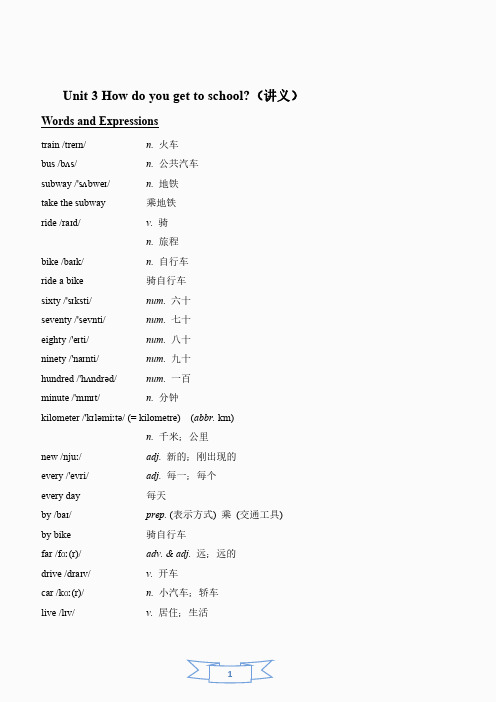
Unit3How do you get to school?(讲义)Words and Expressionstrain/treɪn/n.火车bus/bʌs/n.公共汽车subway/'sʌbweɪ/n.地铁take the subway乘地铁ride/raɪd/v.骑n.旅程bike/baɪk/n.自行车ride a bike骑自行车sixty/'sɪksti/num.六十seventy/'sevnti/num.七十eighty/'eɪti/num.八十ninety/'naɪnti/num.九十hundred/'hʌndrəd/num.一百minute/'mɪnɪt/n.分钟kilometer/'kɪləmiːtə/(=kilometre)(abbr.km)n.千米;公里new/njuː/adj.新的;刚出现的every/'evri/adj.每一;每个every day每天by/baɪ/prep.(表示方式)乘(交通工具)by bike骑自行车far/fɑː(r)/adv.&adj.远;远的drive/draɪv/v.开车car/kɑː(r)/n.小汽车;轿车live/lɪv/v.居住;生活stop/stɒp/n.车站;停止think of认为cross/krɒs/v.横过;越过river/'rɪvə(r)/n.河;江many/'meni/adj.&pron.许多village/'vɪlɪdʒ/n.村庄;村镇between/bɪ'twiːn/prep.介于……之间between…and…在……和……之间bridge/brɪdʒ/n.桥boat/bəut/n.小船ropeway/'rəup,weɪ/n.索道year/jɪə/n.年;岁afraid/ə'freɪd/adj.害怕;畏惧like/laɪk/prep.像;怎么样villager/'vɪlɪdʒə(r)/n.村民leave/liːv/v.离开dream/driːm/n.梦想;睡梦v.做梦true/truː/adj.真的;符合事实的come true实现;成为现实Dave/deɪv/戴夫(男名)Role-playLisa:Hey,Jane.Is this your new bike?Jane:Yes.I ride it to school every day.How do you get to school? Lisa:I usually take the bus.Jane:How far is it from your home to school?Lisa:I’m not sure…about10kilometers?The bus ride takes about 20minutes.How long does it take you to get to school? Jane:About15minutes by bike.It’s good exercise.Lisa:Yeah.Well,have a good day at school. Jane:You,too.练一练:将问句和答语连起来How does Mike get to school? How long does it take to get home? How far is it from here?It’s five kilometers. He rides his bike. About15minutes.Grammar FocusHow do you get to school? How does she get to school? How long does it take to get to school?How far is it from your home to school?Does Jane walk to school?Do they take the bus to school?I ride my bike.She usually takes the bus.It takes about15minutes.It’s only about two kilometers. No,she doesn’t.She goes by bike. No,they don’t.They walk.用适当的介词或者动词填空1.She often goes to work_______bus.2.His father_______the train to Beijing.3.Many people________(驾车)to work now.4.My mother comes here_______train.5.Tom goes to school_______his bike.6.Lucy often gets to school_______her father’s car.7.I go to work______foot every day.ReadingRead the passage and answer the questions.Crossing the River to SchoolHow do you get to school?Do you walk or ride a bike?Do you go by bus or by train?For many students,it is easy to get to school.But for the students in one small village in China,it is difficult.There is a very big river between their school and the village.There is no bridge and the river runs too quickly for boats.So these students go on a ropeway to cross the river to school.One11-year-old boy,Liangliang,crosses the river every school day.But he is not afraid.“I love to play with my classmates.And I love my teacher.He’s like a father to me.”Many of the students and villagers never leave the village.It is their dream to have a bridge.Can their dream come true?1.How do the students in the village go to school?____________________________________________________ 2.Why do they go to school like this?____________________________________________________ 3.Does the boy like his school?Why?____________________________________________________ 4.What is the villagers’dream?Do you think their dream can come true?____________________________________________________Exercises一、词汇填空1.My father usually takes the s__________to work.2.It is three k__________from my home to school,so I usually takethe bus to school.3.I often r__________my bike to school.4.There is a b__________over the river.5.Today I sit b__________Lily and Lucy.6.It’s not easy__________(work)out the problem.7.There are__________people and__________water on the street.(much/many)8.There are three__________(百)teachers in our school.9.My__________(梦想)is to be a singer.10.Most of the girls____________________(害怕)dogs.11.The old woman lives in a small__________(村庄).12.__________(越过)the river and you will get there.二、单项选择()13.—_____do you get to school?—_____my parent’s car.A.How;InB.How long;OnC.How far;InD.How;by()14.—How does Mr.Smith go to work?—He usually______.A.by bus to workB.take the busC.goes to work to take a busD.goes to work on a bus ()15.—_____it take you to walk from your home to your office?—At least(至少)40minutes.A.How far isB.How much time isC.How doesD.How long does()16.—_____is it from your home to school?—It’s three miles.A.How oldB.How farC.How muchD.How long()17.It_____about15minutes____the theatre.A.take;walkB.takes;to walkC.takes;to walk toD.take;to walk()18.It is difficult______English well.A.learnB.to learnC.learningD.learns ()19.He is a______boy.A.five years oldB.five-year-oldC.five-years-oldD.five year old三、用所给的单词组短语,并用短语的适当形式填空20.to,school,get to,does,how long,take,it________________________________________________? 21.school,your,from,it,is,how far,home,to________________________________________________? 22.you,to,walk,do,school________________________________________________? 23.ride,their bikes,do,school,your friends,to________________________________________________? 24.He often goes to work by car.(就划线部分提问)____________________he often__________to work?25.It is four miles from my home to school.(就划线部分提问)____________________is it from your home to school?26.It takes me twenty minutes to get home from school.(就划线部分提问)______________________________it__________you to get home from school?27.我认为她的梦想能够实现。
人教版新目标英语七年级下册Unit 3 How do you get to school?知识点小结

人教版新目标英语七年级下册Unit 3 How do you get toschool?1.疑问词①how 如何(方式),询问交通方式How do you go home? I walk/ride my bike.②how long 多长(时间)答语常用“(For/ about +)时间段”③how far多远(距离)答语常用“(It’s +)数词+miles/ meters/ kilometers/ride/walk..例子:1.__ does it take you to get from your home to school? 从你家到学校大约花费多长时间?---It's about twenty minutes.大约20分钟A. How longB. How farC. HowD. What time 此处选A.2. ___ is it from your home to school? It's about twenty minutes' bus ride.大约20分钟的公车旅程.A. How longB. How farC. HowD. What time 此处选B.④how often多久一次(频率)答语常用“Always/ often/ every day/…”或“次数+时间”等表频率的状语⑤how many多少个(询问可数名词的数量多少)⑥how much多少(询问不可数名词数量的多少,比如牛奶、面包等);还可询问价格,多少钱⑦how old 多少岁(询问年龄)why为什么(原因,由because引出答语) what什么who 谁2.宾语从句要用陈述句语序Mary wants to know where Bob lives.玛丽想知道鲍勃住哪里。
Mary wants to know how far it is from your home to school.玛丽想知道你家到学校有多远。
七年级英语下册 Unit 3 How do you get to school要点详解素材3 (新版)人教新目标版
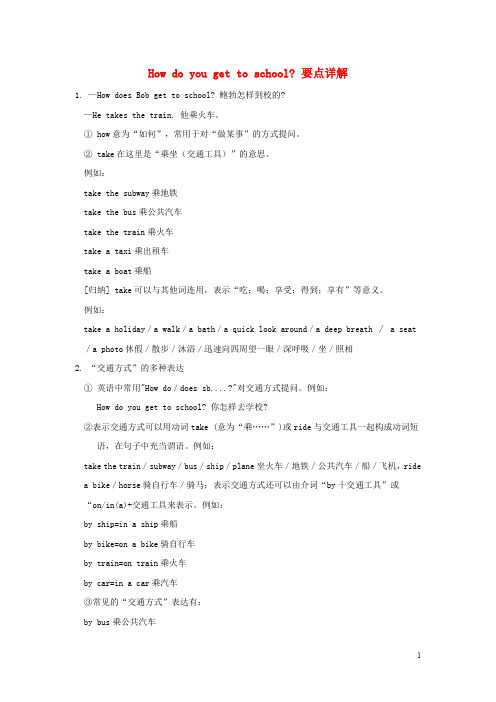
How do you get to school? 要点详解1. —How does Bob get to school? 鲍勃怎样到校的?—He takes the train. 他乘火车。
① how意为“如何”,常用于对“做某事”的方式提问。
② take在这里是“乘坐(交通工具)”的意思。
例如:take the subway乘地铁take the bus乘公共汽车take the train乘火车take a taxi乘出租车take a boat乘船[归纳] take可以与其他词连用,表示“吃;喝;享受;得到;享有”等意义。
例如:take a holiday/a walk/a bath/a quick look around/a deep breath ∕ a seat /a photo休假/散步/沐浴/迅速向四周望一眼/深呼吸/坐/照相2. “交通方式”的多种表达①英语中常用"How do/does sb....?"对交通方式提问。
例如:How do you get to school? 你怎样去学校?②表示交通方式可以用动词take (意为“乘……”)或ride与交通工具一起构成动词短语,在句子中充当谓语。
例如:take the train/subway/bus/ship/plane坐火车/地铁/公共汽车/船/飞机,ride a bike/horse骑自行车/骑马;表示交通方式还可以由介词“by十交通工具”或“on/in(a)+交通工具来表示。
例如:by ship=in a ship乘船by bike=on a bike骑自行车by train=on train乘火车by car=in a car乘汽车③常见的“交通方式”表达有:by bus乘公共汽车by train乘火车by ship/sea乘船by plane/air乘飞机by bike骑自行车by car乘小汽车on foot步行go to…by car=drive to…go to…by bike=ride to…go to…on foot=walk to…go to…by plane/air=fly to…3. It takes about forty minutes. 大约花费40分钟。
人教版七年级英语下册unit3(详细内容)
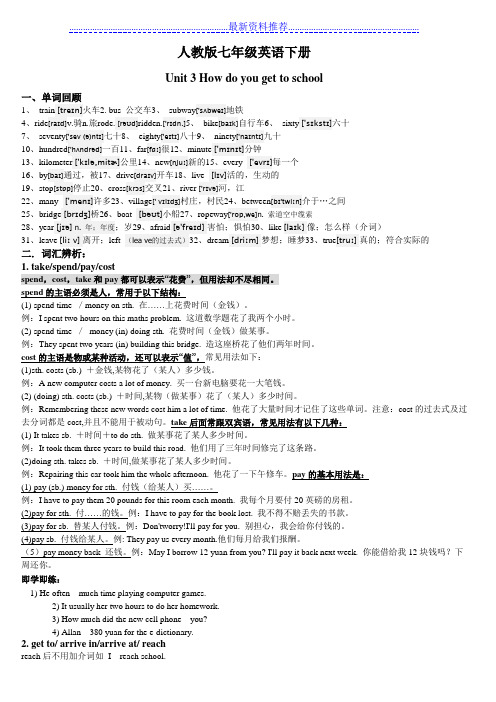
人教版七年级英语下册Unit 3 How do you get to school一、单词回顾1、train[treɪn]火车2. bus 公交车3、subway['sʌbweɪ]地铁4、ride[raɪd]v.骑n.旅rode. [rəʊd]ridden.['rɪdn.]5、bike[baɪk]自行车6、sixty['sɪkstɪ]六十7、seventy['sev (ə)ntɪ]七十8、eighty['eɪtɪ]八十9、ninety['naɪntɪ]九十10、hundred['hʌndrəd]一百11、far[fɑː]很12、minute['mɪnɪt]分钟13、kilometer['kɪlə,mitɚ]公里14、new[n juː]新的15、every ['evrɪ]每一个16、by[baɪ]通过,被17、drive[draɪv]开车18、live [lɪv]活的,生动的19、stop[stɒp]停止20、cross[krɔs]交叉21、river ['rɪvə]河,江22、many ['menɪ]许多23、village[' vɪlɪdʒ]村庄,村民24、between[bɪ'twiːn]介于…之间25、bridge[brɪdʒ]桥26、boat [bəʊt]小船27、ropeway['rop,we]n. 索道空中缆索28、year[jɪə]n. 年;年度;岁29、afraid[ə'freɪd]害怕;惧怕30、like [laɪk]像;怎么样(介词)31、leave [liː v]离开;left (lea ve的过去式)32、dream[driːm]梦想;睡梦33、true[truː]真的;符合实际的二. 词汇辨析:1. take/spend/pay/costspend,cost,take和pay都可以表示“花费”,但用法却不尽相同。
英语七年级下册Unit3-How do you get to school知识点

Unit 3 How do you get to school?一、本单元知识点总结1.get to school 到校2.take the subway 乘地铁3.take the train 坐火车4.leave for 到……地方去,离开去某地5.take…to…把……带到……6. most students 大多数学生7. from…to…从……到…… 8.think of 想到,想起9.ride bikes 骑自行车10.in other parts of the world 在世界的其他地方11. how far 多远(路程、距离) 12.how long多长〔时间〕13.take the train to school 乘火车去上学14.in places 在一些地方15.go to school by boat乘船去上学16.on the school bus乘坐校车17.be different from和……不同18.one 11-year old boy 一个十一岁的男孩二、重点知识详解1.take +a/an/the+表示交通工具的名词,乘……去某地,是动词短语He takes the train. take the subway乘地铁take a walk散步take a shower洗个澡take a rest休息一会take a seat 坐下take some medicine 吃药2.by+表示交通工具的单数名词或on/in+ a/an/the/one’s+表示交通工具的单数名词,是介词短语作方式状语。
I get to school by bike. = I get to school on my bike.3.walk/ride/drive/fly+to+地点名词,步行/骑自行车/开车/坐飞机去某地表示乘交通工具方式可以互换表达一样的意义:Take the bus to school=go to school by bus=go to school on a busDrive a car to work=go to work by car=go to work in a carFly to shanghai=go to shanghai by plane/air=take the/a plane to shanghai=go to shanghai on a/an/the plane.4.get表示“到达〞,后接名词需加to,接地点副词不加to.reach 给示到达,是及物动词,其后直接接宾语。
Unit3Howdoyougettoschool?单元背诵人教版七年级英语下册
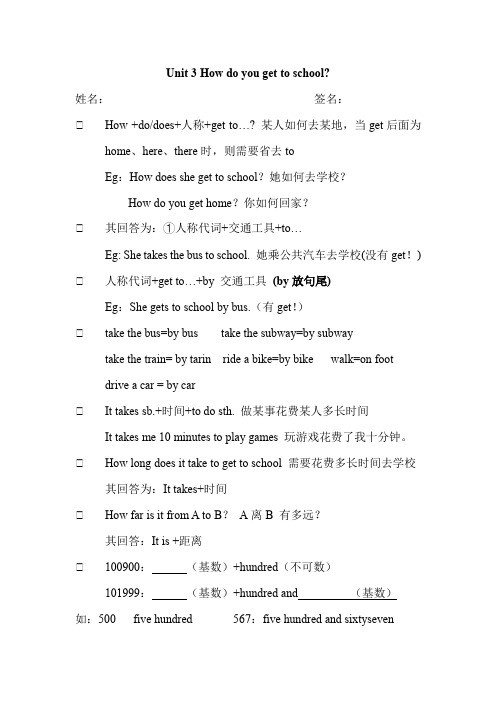
Unit 3 How do you get to school?姓名:签名:①How +do/does+人称+get to…? 某人如何去某地,当get后面为home、here、there时,则需要省去toEg:How does she get to school?她如何去学校?How do you get home?你如何回家?①其回答为:①人称代词+交通工具+to…Eg: She takes the bus to school. 她乘公共汽车去学校(没有get!)①人称代词+get to…+by 交通工具(by放句尾)Eg:She gets to school by bus.(有get!)①take the bus=by bus take the subway=by subwaytake the train= by tarin ride a bike=by bike walk=on footdrive a car = by car①It takes sb.+时间+to do sth. 做某事花费某人多长时间It takes me 10 minutes to play games 玩游戏花费了我十分钟。
①How long does it take to get to school 需要花费多长时间去学校其回答为:It takes+时间①How far is it from A to B?A离B 有多远?其回答:It is +距离①100900:(基数)+hundred(不可数)101999:(基数)+hundred and (基数)如:500 five hundred 567:five hundred and sixtyseven①hundreds of… 数百(+s)①It is good exercise. 它是一个不错的运动。
①Think of 认为;What do you think of+doing?你认为…怎么样?①For many students 对于很多学生来说①In one small village in China. 在中国的一个小村庄①The river runs too quickly 水流太快了①11yearold =11 years old(an eleven)①Between A and B 在A与B之间between you and me 在你和我之间①Be like =look like 看起来像①Dream e ture 梦想实现①be afraid of doing sth. =be afraid to do sth. 害怕做某事①too+adj. 太… too fun 太有趣了!so+adj. 如此…. So fun 如此有趣②①go on ropeway 坐索道②②leave the village 离开村庄②③at the bus stop在公共汽车站。
(完整版)Unit3Howdoyougettoschool知识小结和练习
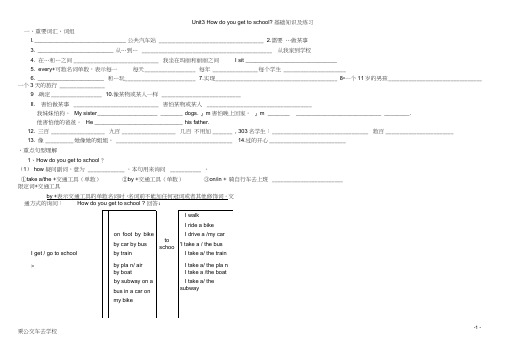
Unit3 How do you get to school? 基础知识及练习一、重要词汇、词组I. _____________________________ 公共汽车站 _____________________________________ 2.需要 …做某事3. ________________________ 从…到… ______________________________________________ 从我家到学校4. 在…和…之间 ______________________________ 我坐在玛丽和丽丽之间I sit _____________________________ 5. every+可数名词单数,表示每一 每天 __________________ 每年 ________________ 每个学生 ______________________6. _____________________ 和…玩 _________________________7.实现 ___________________________________________ 8•—个11岁的男孩 _________________________________ 一个3天的旅行 ________________9 .确定 __________________ 10.像某物或某人一样 ____________________________II. 害怕做某事 ______________________________ 害怕某物或某人 _____________________________________我妹妹怕狗。
My sister ___________________ _______ dogs. 』m 害怕晚上回家。
』m _______ ___________________________ ________ .他害怕他的爸爸。
人教版英语七年级下册 Unit 3 How do you get to school_ Sectio

Unit 3 How do you get to school?Period 5Section B (2a-2c)教学目标:1.重点单词:cross,river,many,village,between,bridge,boat,ropeway,year,afraid,like,villager,leave,dream,true2.重点短语:one 11yearold boy,between...and...,come true,be like3.重点句式:For many students,it's easy to get to school.There is a very big river between their school and the village.It is their dream to have a bridge. Can their dream come true?教学重点:1.重点短语和句型2.掌握基本的阅读方法。
教学难点:重点短语和句型预习指导:预习课本P17新单词并识记,完成下面的汉译英.1.横过____________ 2.河______________3.许多____________4. 村庄____________5.村民____________ 6. 桥______________7.小船____________8.像______________9.年______________10.害怕____________11.离开____________12.梦想____________13.真的____________14.介于……之间_____________________教学过程:Step 1 GreetingsStep 2 Present the learning aims.Step 3 Check the new words and phrases. 师友互查单词Step 4 Lead in new lesson with several pictures. 师友看图对话Step 5 New lessone to 2a看图片和2a 短文标题,预测2a 短文主要是讲述什么的2.Fast readingHow does Liangliang go to school every day? Why?3.Careful reading1) Finish 2b. Read the passage and answer the questions.a. How do the students in the village go to school?b. Why do they go to school like this?c. Does the boy like this school? Why?d. What’s the villagers’ dream? Do you think their dream can come true? Why or whynot?先独立完成,再师友互助检查。
- 1、下载文档前请自行甄别文档内容的完整性,平台不提供额外的编辑、内容补充、找答案等附加服务。
- 2、"仅部分预览"的文档,不可在线预览部分如存在完整性等问题,可反馈申请退款(可完整预览的文档不适用该条件!)。
- 3、如文档侵犯您的权益,请联系客服反馈,我们会尽快为您处理(人工客服工作时间:9:00-18:30)。
Unit 3 How do you get to school
Section B 1a-2c
一、教学目标:
1. 语言知识目标:
1) 能掌握以下单词:
drive, live, stop, think of, cross, river, many, village, villager, between, between…and…, bridge, boat, ropeway, year, afraid, like, dream, come true 2) 表达采用怎样的交通方式去某地:
Well, I ride my bike to the subway station.
Then I take the subway.
3) 阅读短文,获取相关信息的能力。
2. 情感态度价值观目标:
了解东西方国家出行方式的不同,以及不同的交通规则,教育学生注意交通安全, 加深对交通知识的了解。
倡导自觉遵守交通法规及礼貌,构建和谐的人际关系。
了解交通的发展,培养创新精神。
二、教学重难点
1. 教学重点:
1) 通过进行听、说的训练,来提高学生们综合运用所学知识的能力。
2) 通过读、写的训练,来让学生们能真正在实际活动中运用所学的知识。
2. 教学难点
听力训练与阅读训练
三、教学过程
Ⅰ. Warming- up and revision
1. Greet Ss as usual.
2. Check the homework.
Ⅱ. Presentation
1. 我们来认识几个新单词。
I'll show you some pictures on the screen. L et's learn
some new words. (在屏幕上展示p16页的图片)
2. Ss read and try to remember the new words and expressions.
Ⅲ. Match
T: 1. Let's open our books at page 16, point out the blank line in front of each numbered phrase. Ask Ss to match each phrase with a p icture by writing the letter of the picture in the bank in front of the correct word. One has done for students.
2. Check the answers.
Ⅳ. Pairwork
1. First ask two students to read the dialogue to the class.
Sa: How do you get to school?
Sb: Well, I ride my bike to the subway station. Then I take the subway.
2. Suppose you use two kinds of transportation to get to school. Tell your partner how you get ot school.
3. Ss practice the conversations in pairs.
4. Let some pairs to act out their conversations.
Ⅴ. Listening
1c:
1. Ask different Ss to read each line to the class
2. Play the tape for the Ss to listen and check the things Mary want s to know.
3. Get Ss finish the listening task then check the answers.
1d:
1. Listen again. How does Bob get to h is grandparents' home? Check 1 or
2.
2. Play the tape twice for the Ss to listen and check.
3. Check the answers.
Ⅵ. Talking
1. Let students tell how Bob gets to his grandparents' home. Ask students to use
the
pictures in 1d. And write these sentences on the blackboard.
First he … Next he… Then he… Finally…
2. Ss work with their partners. Try to say how Bob get to his grandparent's home.
3. Check the answers:
Ⅶ. Guess
1. Look at the picture and title below. Guess what the passage is about.
T: I think it's about how some students get to school. What do you think?
S1: I think it's about how some students in the village get to school.
S2: I think it's about how some students in the mountain get to school.
Ⅷ. Reading
1. Fast reading
Read the passage and find the answer to this question:
What's the students' and the villagers' dream in this village?
Ss read the passage quickly and find the answer to this question:
Their dream is to build a bridge.
2. Careful reading
Read the passage again an d find the answers to the questions below:
1. How do the students in the village go to school?
2. Why do they go to school like this?
3. Does the boy like his school? Why?
4. What is the villager's dream? Do you think their dream can come true?
阅读指导:首先,读这四个问题,记住这四个问题。
其次,带着问题去仔细读短文,并在短文中寻找相关问题的回答依据。
然后,根据相关依据,写出问题的答案。
Ss read the passage again and try to find the answers to the questions.
Check the answers with the class.
Ⅸ. Reading
1. Let's work on 2c. Let's read the passage again and complete the sentences with the words from the passage.
2. 阅读指导:
1) 首先,阅读这个五个句子,掌握句子的意思,大体确定空格处所缺单词的词性,是形容
词、名词还是动词等。
2)其次,带着这五个句子,在短文去寻找与这五个句子相关的依据。
在相关的句子中寻找空格处所缺的单词。
比如:第一句应是在短文中的第五句中“But for the students in
a village in Yunnan, it is difficult.”,可知本空格处应为difficult一词。
其他
几个也按这样的方法来做。
3)最后,再读一遍这些句子,看有不有不恰当的地方。
3. Check the answers:
difficult, big, quickly, afraid, true
Homework
1. Remember the new words and expressions in this period.
2. Ask Ss try to retell the passage after class.
板书设计:。
